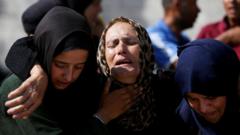Hamas has expressed a readiness to enter negotiations for a new ceasefire in Gaza, coinciding with ongoing Israeli airstrikes that have killed many Palestinians. The situation remains tense as both sides seek to establish a dialogue for peace.
Hamas Signals Willingness to Negotiate Ceasefire Amid Ongoing Violence

Hamas Signals Willingness to Negotiate Ceasefire Amid Ongoing Violence
Hamas indicates a "positive response" to US-backed ceasefire proposal while Israeli military continues bombardment.
In a statement released earlier, Hamas affirmed its "serious readiness" to negotiate regarding the newly proposed ceasefire, which involves a 60-day truce and the potential release of hostages currently held by the group. Although Hamas has not finalized its acceptance of the plan, their officials conveyed that they are willing to discuss the proposal with mediators. Former President Donald Trump commented that he expects a definitive response from Hamas sooner rather than later, potentially within a day.
Israeli Prime Minister Benjamin Netanyahu has confirmed Israel's agreement to the ceasefire conditions, which reportedly include the phased release of Israeli hostages and the return of 18 Israeli bodies in exchange for Palestinian prisoners. A key condition from Hamas involves the urgent resumption of unrestricted food and medical supplies to Gaza, which would be coordinated with humanitarian organizations like the United Nations and the Red Cross. Additionally, the ceasefire plan stipulates a gradual withdrawal of Israeli military forces from Gaza, along with strong assurances against the resumption of hostilities after the proposed ceasefire period.
The Israeli military, however, has continued its air campaign, claiming that its operations aim to dismantle Hamas military capabilities. Reports indicate that at least 138 Palestinians were killed in just 24 hours due to the strikes, drawing emotional responses from families grieving their losses. Community leaders and ordinary citizens have voiced their desperation for an end to the violence, illustrating the human toll the conflict has taken.
International organizations, including the Red Cross and Médecins Sans Frontières, have called for an immediate cessation of hostilities as the situation in Gaza continues to deteriorate. Amidst this turmoil, rallies have emerged in Israeli cities where families of hostages advocate for a comprehensive agreement that leads to the release of those held captive. They implore leaders to negotiate effectively and bring peace to the region.
As intensifying airstrikes complicate efforts for a lasting ceasefire, the fate of hostages remains a crucial priority for Israeli authorities, while Hamas seeks to leverage negotiations to alleviate humanitarian crises in Gaza. Both sides face increasing pressure as they confront the grim realities of continued conflict.
Israeli Prime Minister Benjamin Netanyahu has confirmed Israel's agreement to the ceasefire conditions, which reportedly include the phased release of Israeli hostages and the return of 18 Israeli bodies in exchange for Palestinian prisoners. A key condition from Hamas involves the urgent resumption of unrestricted food and medical supplies to Gaza, which would be coordinated with humanitarian organizations like the United Nations and the Red Cross. Additionally, the ceasefire plan stipulates a gradual withdrawal of Israeli military forces from Gaza, along with strong assurances against the resumption of hostilities after the proposed ceasefire period.
The Israeli military, however, has continued its air campaign, claiming that its operations aim to dismantle Hamas military capabilities. Reports indicate that at least 138 Palestinians were killed in just 24 hours due to the strikes, drawing emotional responses from families grieving their losses. Community leaders and ordinary citizens have voiced their desperation for an end to the violence, illustrating the human toll the conflict has taken.
International organizations, including the Red Cross and Médecins Sans Frontières, have called for an immediate cessation of hostilities as the situation in Gaza continues to deteriorate. Amidst this turmoil, rallies have emerged in Israeli cities where families of hostages advocate for a comprehensive agreement that leads to the release of those held captive. They implore leaders to negotiate effectively and bring peace to the region.
As intensifying airstrikes complicate efforts for a lasting ceasefire, the fate of hostages remains a crucial priority for Israeli authorities, while Hamas seeks to leverage negotiations to alleviate humanitarian crises in Gaza. Both sides face increasing pressure as they confront the grim realities of continued conflict.




















